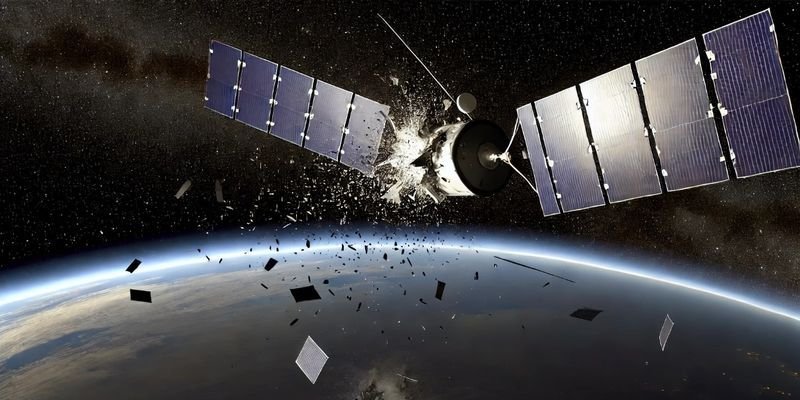Startup
Boeing’s Satellite Breaks Apart in Space: What Went Wrong and What’s Next?

On October 19, 2024, Boeing’s Intelsat 33e, a high-stakes communication satellite, abruptly failed and broke apart while in geostationary orbit, 35,000 kilometers above Earth. Known as a part of the EpicNG series, this satellite was launched in August 2016 with the ambitious goal of providing broadband and broadcasting services to under-connected regions in Europe, Africa, and the Asia-Pacific. Although designed to serve for a full 15 years, Intelsat 33e barely reached the halfway mark, breaking up into over 20 debris fragments tracked by the U.S. Space Force. This unplanned disintegration has set off a wave of questions about what could have led to such a significant failure.
The causes behind this unexpected incident remain unconfirmed, but experts are examining various scenarios, including structural malfunctions, undetected mechanical issues, increased solar activity, a possible micrometeoroid impact, or even a collision with space debris. This isn’t Intelsat 33e’s first issue in space—it was delayed in reaching its original orbit and had propulsion issues that forced it to consume more fuel than planned, leaving it with a shorter lifespan than expected. With the satellite now out of commission and, notably, uninsured, the financial impact on both Boeing and Intelsat will be substantial. For Intelsat, this is a particularly hard hit, as the EpicNG series was a major step forward in improving global connectivity.
The Space Junk Dilemma: A Growing Hazard in Earth’s Orbit
The satellite’s breakup has added to the growing problem of space debris, an issue that has become a pressing concern as Earth’s orbit becomes increasingly cluttered. According to the European Space Agency (ESA), over 40,000 fragments larger than 10 cm and millions of smaller particles are currently orbiting Earth. This debris, which collectively weighs about 4,300 tonnes, poses a significant risk to operational satellites and space missions. Jonathan McDowell from the Harvard-Smithsonian Center for Astrophysics emphasised that the latest incident underscores the necessity for better monitoring and debris management strategies in space.
Unlike low Earth orbit (LEO), where decommissioned satellites can often be steered to burn up in Earth’s atmosphere, geostationary orbit poses unique challenges. The 35,000-kilometer altitude, where the Intelsat 33e was stationed, is often too high for objects to be safely deorbited without additional propulsion. Debris in this orbit tends to stay for decades or even centuries, raising the risk of collisions that could produce even more fragments in what’s known as the Kessler syndrome—a cascading effect where debris from one collision triggers more and more collisions, eventually making certain orbital regions unusable.
Why This Matters: Industry Accountability and Regulatory Ramifications
For Boeing, this incident adds to an already challenging year. The aerospace giant has faced ongoing issues with its aircraft manufacturing division, delays in its Starliner spacecraft program, and now the high-profile failure of Intelsat 33e. Each incident raises concerns about quality control, design reliability, and corporate accountability, which could impact Boeing’s future contracts and reputation. For instance, Boeing’s prior satellite, Intelsat 29e, also suffered a catastrophic failure in 2019, and industry analysts speculate that further scrutiny could lead to stricter regulations on satellite manufacturing and more stringent operating standards for space-based infrastructure.
The loss of Intelsat 33e may prompt other satellite manufacturers and operators to reconsider their approach to satellite durability, fail-safes, and overall mission planning. As the satellite industry continues to grow, companies are under increasing pressure to avoid contributing to the already overwhelming accumulation of space debris. In recent years, entities like the U.S. Federal Communications Commission (FCC) and international space regulatory bodies have explored fines and operational restrictions on companies responsible for space debris, with a notable fine issued in 2023—the first of its kind. Whether or not Intelsat or Boeing will face similar fines or restrictions is yet to be determined, but the incident is likely to spark more conversations around space sustainability and corporate responsibility in orbit.
The Bigger Picture: Future Implications for Space Missions and Sustainability
This Boeing satellite failure offers a stark reminder of the complexities and risks associated with space operations. Each failed mission or satellite breakup adds not just operational costs but also environmental hazards in the form of space debris. The ESA, NASA, and other space agencies are investing in research to track and potentially clear space debris, exploring technologies like robotic arms, nets, and even harpoons designed to “capture” defunct satellites and bring them down safely.
As space commercialisation accelerates—with mega-constellations like Starlink and Kuiper planning thousands of new satellite launches—these technologies are becoming essential to preserve the viability of Earth’s orbits. The 2024 Intelsat 33e incident exemplifies the importance of preemptive measures and the need for more stringent standards to govern the rapidly expanding space economy. Looking ahead, companies must prioritise sustainability in their designs and operations, both to prevent debris and to protect the operational assets in space.
Startup
ED searches 19 premises of Amazon, Flipkart vendors in FEMA probe

The Enforcement Directorate Thursday conducted searches against some of the “main vendors” operating on platforms of ecommerce giants and as part of a foreign investment “violation” investigation, official sources said.
A total of 19 premises of these “preferred” vendors located in Delhi, Gurugram and Panchkula (Haryana), Hyderabad (Telangana), and Bengaluru (Karnataka) were covered as part of the action, the sources said.
It is learnt that the ED inspected documents and took copies of some from the premises of about six such vendors who were not named.
The sources said a probe has been initiated by the federal agency under the provisions of the Foreign Exchange Management Act (FEMA) after it received several complaints against the two large ecommerce companies, where it is alleged that they were “violating India’s FDI (foreign direct investment) rules by directly or indirectly influencing the sale price of goods or services and not providing level playing field for all the vendors”.
There was no immediate response from the two ecommerce companies.
Meanwhile, the Confederation of All India Traders (CAIT) welcomed the ED action.
“The CAIT, along with several other trade bodies, has been raising these issues for the past few years. I welcome the Enforcement Directorate’s actions as a step in the right direction,” CAIT Secretary General Praveen Khandelwal said in a statement.
He claimed that the Competition Commission of India (CCI) had also issued “penalty notices” to Amazon and Flipkart, and their “preferred” sellers, for “engaging” in anti-competitive practices that have adversely affected small traders and ‘kirana’ (grocery) stores.
It has been reported in the past that the CCI, which works to ensure fair business practices across sectors in the marketplace, is already looking into alleged anti-competitive ways of ecommerce companies.
The CAIT and mainline mobile retailers’ association AIMRA had also petitioned the CCI sometime back seeking immediate suspension of operations of Flipkart and Amazon as they alleged that the companies engaged in predatory pricing and were burning cash to offer heavy discounts on products.
These practices, in turn, are creating a grey market of mobile phones, causing losses to the exchequer “as players in the grey market evade taxes”, they had said.
Commerce and Industry Minister Piyush Goyal had recently flagged the same concerns as he had questioned Amazon’s announcement of a $1 billion investment in India, saying the US retailer was not doing any great service to the Indian economy but filling up for the losses it had suffered in the country.
He had said in August that their huge losses in India “smells of predatory pricing”, which is not good for the country as it impacts crores of small retailers.
Goyal said e-commerce companies were eating into the small retailers’ high-value, high-margin products that are the only items through which the mom-and-pop stores survive.
The minister had said that with the fast-growing online retailing in the country, “are we going to cause huge social disruption with this massive growth of ecommerce”.
Khandelwal said that the CAIT has urged the CCI and the ED to protect the businesses of small traders.
“In the new Bharat, led by Prime Minister Narendra Modi Ji, no one is above the law. I am hopeful that now the law will take its rightful course and protect the livelihoods of small shopkeepers.
“This government is committed to ensuring that no entity can harm the trading community. In response to multiple complaints filed by the trading community regarding FDI violations and the anti-competitive practices of quick-commerce companies such as Blinkit, Swiggy, and Zepto, we urge both the CCI and the ED to take swift action and prevent any further, irreparable damage to the businesses of small traders,” he said in the statement.
Startup
Irdai proposes to amend regulatory sandbox norms

Regulator Irdai has proposed to amend the norms related to ‘regulatory sandbox’ by incorporating principle-based approach and further facilitating the adoption of innovative ideas and new concepts across the insurance value chain.
Regulatory sandbox usually refers to live testing of new products or services in a controlled/test regulatory environment for which regulators may or may not permit certain relaxations.
The Insurance Regulatory and Development Authority of India (Irdai) constituted an internal committee to review the Irdai (Regulatory Sandbox) Regulations.
Based on the recommendations of the committee, it has proposed amendments to the regulatory sandbox regulations and seeks comments from the public at large on the proposed amendments.
Issuing an exposure draft on regulatory sandbox regulations, Irdai said the amendment seeks adoption of principle based approach over rule based approach.
The changes to the norms are also aimed to facilitate the introduction of innovative ideas/new concepts across the insurance value chain, Irdai said.
Irdai has invited comments from the stakeholders on ‘Exposure draft – Irdai (Regulatory Sandbox) (Amendment) Regulations, 2024’ by November 25.
Startup
Prodigy Finance secures $310M financing from DFC

Prodigy Finance, a global higher education finance company, has secured financing of up to $310 million with a funding commitment from the US International Development Finance Corporation (DFC).
This latest financing, building on the previous partnership with DFC, prioritises social impact with a minimum financing threshold of 30% for women and 50% for individuals from low- and lower-middle-income countries, it said in a statement.
“Together, we are empowering a new generation of global leaders to unlock opportunities that shape a brighter future,” said Prodigy Finance Chief Financial Officer Neha Sethi.
The higher education finance company’s borderless lending model allows students to apply for loans based on their future earning potential rather than their current circumstances or credit history.
Since its founding in 2007, the international student lender has enabled over 43,000 postgraduate master’s students to attend top universities, disbursing over $2.3 billion in funding to students from more than 150 countries.
Sonal Kapoor, Global Chief Commercial Officer of Prodigy Finance, told YourStory that India is its core market and has the largest share of its funding.
According to the Prodigy Finance 2022 Impact Report, students reported that the company’s loan helped them to pursue their dream career (91%), achieve success in their personal life (83%), and at least double their salary (74%).
In September, Prodigy Finance launched a $30 million blended finance programme in collaboration with The Standard Bank of South Africa Limited and Allan & Gill Gray Philanthropies.
-

 Startup Stories1 year ago
Startup Stories1 year agoWhy Millennials, GenZs Are Riding The Investment Tech Wave In India
-

 Startup Stories1 year ago
Startup Stories1 year agoStartups That Caught Our Eyes In September 2023
-

 Startup Stories1 year ago
Startup Stories1 year agoHow Raaho Is Using Tech To Transform India’s Fragmented Commercial Trucking
-

 Startup Stories12 months ago
Startup Stories12 months agoMeet The 10 Indian Startup Gems In The Indian Jewellery Industry’s Crown
-

 Crptocurrency8 months ago
Crptocurrency8 months agoLither is Making Crypto Safe, Fun, and Profitable for Everyone!
-

 Startup Stories1 year ago
Startup Stories1 year agoHow Volt Money Is Unlocking The Value Of Mutual Funds With Secured Lending
-

 Startup Stories1 year ago
Startup Stories1 year agoWhy Moscow-Based Kladana Considers Indian SME Sector As The Next Big Market For Cloud Computing
-

 E-commerce1 year ago
E-commerce1 year agoTop Online Couponing Trends To Watch Out For In 2016




